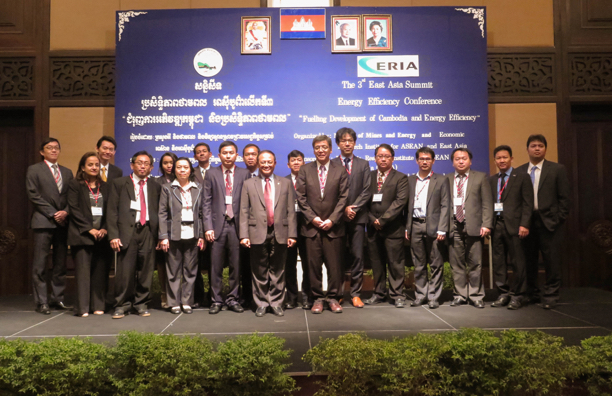The 3rd East Asia Summit Energy Efficiency Conference in Phnom Penh Report
Feb. 26, 2015

Photo by ERIA
The 3rd East Asia Summit Energy Efficiency Conference (EEC) was held in Phnom Penh on January 16, 2015, supported by the ASEAN Center for Energy (ACE) and the Ministry of Economy, Trade and Industry of Japan (METI). It was also jointly organized by the Economic Research Institute for ASEAN and East Asia (ERIA) and the Ministry of Mines and Energy of Cambodia (MME). Both the prosperity of the export-oriented light industry and development of offshore energy resources in recent years in Cambodia suggest an energy-based economic growth. Therefore, MME decided to name this year's EEC “Fueling the Development of Cambodia and Energy Efficiency” and organize the conference with the collaboration of ERIA. Victor Jona (Director General of the MME General Department of Energy), Sanjayan Velautham (Executive Director of ACE), and Katsushi Takehiro (Director of the METI Agency for Natural Resources and Energy International Energy Strategy Office) delivered opening addresses.
Session 1
Director General Jona moderated the first session on “Fueling the Development of Cambodia,” and then presenters discussed how Cambodia would benefit from improved connectivity within the ASEAN. First, Dr. Dionisius Narjoko from ERIA introduced his research findings regarding the impact of the establishment of the ASEAN Economic Community (AEC) on regional trade and investment. He pointed out the future importance of Regional Comprehensive Economic Partnership (RCEP) negotiations. Next, Mr. Hay Sovuthea of the Supreme National Economic Council of Cambodia presented Cambodia's plan for industrial development over the next 10 years, centering on the Southern Economic Corridor. Afterward, the Ministry of Public Works and Transport of Cambodia presented its hard infrastructure development plan with regard to connectivity.
Session 2
Deputy Director General Khamso Kouphokam of the Department of Energy Policy and Planning of Lao PDR's Ministry of Energy and Mines moderated the second session on “Energy Supply Perspective.” In this session, presenters discussed the general condition of Cambodia's primary and secondary energy supply. Director General Cheap Sour of the General Department of Petroleum of MME delivered a presentation on Cambodia's future offshore energy resource development. This presentation was followed by that of Deputy Director General Chan Sodavach from the General Department of Electricity of MME on Cambodia's future electricity development master plan. Cambodia is targeting a 50% electrification rate in 2020 and 70% electrification rate in 2030. Until 2021, Cambodia's demand for electricity is expected to increase 10% annually (and 8% afterwards). Based on this assumption, Cambodia, apart from planning to build more power stations, is implementing programs to increase imports of electricity from Thailand, Vietnam, and Lao PDR.
Session 3
Executive Director Sanjayan moderated the third session on “ERIA EE & RE Studies,” in which the research findings of ERIA's energy program were presented. ERIA Advisor Shigeru Kimura demonstrated Cambodia's energy saving potential by 2035 if active energy saving measures are adopted. According to Mr. Kimura's presentation, Cambodia can eventually save 8% of its total energy usage. Next, Dr. Phoumin Han introduced clean coal technologies. He pointed out that considering the large amount of initial investment, government subsidies would be indispensable. Afterward, Dr. Yanfei Li introduced his research on energy saving by expanding public transportation in the urban transport sector.
Session 4
Dr. Han moderated the fourth session on “Energy Efficiency and Low Carbon Energy,” which featured the report of various government agencies on their ongoing energy-related research. Ms. Amaraporn Achavangkool from the Department of Alternative Energy Development and Efficiency of Thailand's Ministry of Energy introduced ASEAN countries' approaches to reducing energy use and saving energy through to 2035. Currently, in addition to the individual country's efforts, ASEAN members are also working together. Next, Director Toch Sovanna from the New and Renewable Energy Department of MME's General Department of Electricity introduced Cambodia's programs to bring electric power to off-grid rural areas using new energy sources. This report was followed by that of Assistant Professor Wongkot Wongsapai from Chiang Mai University on a factory energy management system project that he is pursuing on a commission from the Thai Ministry of Energy. Lastly, Professor Hisashi Yoshikawa from the University of Tokyo introduced the university's ongoing ERIA research projects.
Session 5
Mr. Kimura moderated the fifth session on “Balancing Economic Growth and Energy.” This session included a panel discussion participated by government officials from various countries' energy departments. Officials from Cambodia, Indonesia, Singapore, and Thailand presented the main points of their countries' future energy policies. For example, according to Mr. Arief Heru Kuncoro of the Directorate of Energy Conservation of Indonesia's Ministry of Energy and Mineral Resources, their country has high hopes for thermal power generation as it plans to increase the share of new energy sources in its energy supply from the current rate of 10% to over 20% in 2025. Moreover, according to Ms. Latha Ganesh (Assistant Director, Energy Policy and Development, Energy Market Authority, Singapore), Singapore plans to improve further its energy efficiency through various incentive schemes and provision of information to the market. Lastly, ERIA Managing Director Shimpei Yamamoto and Director General Jona delivered closing remarks.


